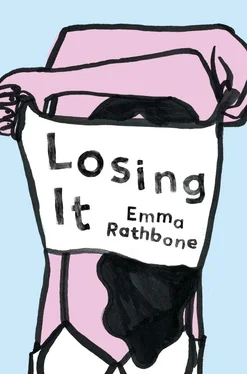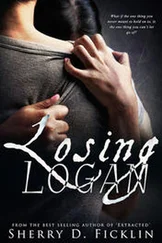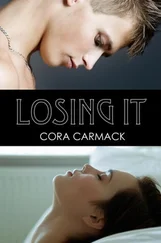I approached his end of the office carrying the heavy, slushing watering can. Caroline was there again, at the desk, wearing more or less the same kind of dress, and awake. She was attempting to shake a snow globe. I didn’t have to look closely to know that her efforts weren’t producing any action. Her head doddered up and down as she brought the snow globe to the left, then the right, then the left again. I walked up to Elliot’s door and knocked. I tried again and still nothing.
I turned around and Caroline was looking at me. “He’s not in,” she said loudly.
“Okay,” I said. I indicated to the watering can. “I just have to—” I turned the knob and pushed.
“Wait—” she said.
I shut the door behind me.
His office. It was dim without the lights on. It felt like a library, everything serene and orderly and muffled. White shelves lined the walls. There was a cup of oversteeped herbal tea on his desk, next to his wireless keyboard. There was a glass paperweight with some pyramids inside it. I walked over to look at one of the pictures on the wall, half noticing that there were no plants in the room except for a little cactus on his desk, which is probably what Caroline had been trying to tell me. It was a large framed poster — a reproduction of a pencil sketch, of a young man, a Native American, sitting on the edge of a wave that had been frozen in time right as it was about to crash. He was dangling his legs over the side, where it was jagged with foam and froth. And then above him, composing the top part of the poster, was a majestic hawk with its wings spread, and in its chest was the moon. Below, it read “Elsu.”
I heard the door clicking behind me. I turned around. Elliot.
“Ah,” he said, glancing quickly around the room.
“Hi,” I said. I held up the watering can. “I was just…”
“Oh, sure,” he said. He walked to his desk and laid a book down on it. “Well, I only have the one,” he said, pointing to the cactus.
He didn’t seem pliable like he had when we first met. He looked a little unnerved to see me in there, not exactly filled with unalloyed gratitude.
“Right,” I said. “Yeah, I noticed. And I guess it doesn’t need any.” I held up the can again.
“No,” he said.
We stood there. He put his hands on his hips and looked around, closed off.
“I guess it’s just nurtured by the winds of time,” I said.
He unlocked a little.
I was about to walk out when he said, “Are you a fan?” and nodded at the poster.
“Oh,” I said. “No. I don’t know.”
“Elsu,” he said. “It’s a book. It used to be pretty famous. It’s about a young Native American guy who could freeze the ocean. He had this mission where he was supposed to climb the tallest wave so he could see his ancestors in the moon from there. And that hawk was his friend and would always guide him to the biggest storms.”
“Oh, okay.”
“And so there are lots of great scenes of him walking across the ocean, along all these planes and dunes of water, under the moon, watching whales under the surface and, you know”—he seemed less sure of himself now; he looked down and gingerly touched the top of his desk—“following his internal music and talking to a hawk.”
“That’s pretty cool,” I said, a little too quickly, “to be able to do that.”
“Yeah,” he said.
“To be able to talk to a hawk,” I clarified.
“Right,” he readjusted. He walked around his desk and sat down in his chair, more composed. He leaned back and smiled. “So, do you think it would be better to be able to talk to a hawk, or stop time?”
I couldn’t tell if he was sort of joking around, or if he really wanted to know. “Talk to a hawk,” I said. “Wait, no. Stop time. Obviously.”
“Right, because then you could—”
“You could, like, stop time during a tour of the White House, and then go into the Oval Office and rummage around and look in a bunch of secret files.”
He smiled. “So that’s what you’d do?”
“Well, I mean, that’s just the first thing I thought of.”
He put his hands behind his head. “I’d do it on a tour of these caves — have you even been to Luray Caverns?”
I shook my head.
“They’re these caves in Virginia, like something from another world. I’d stop time on a tour and go and explore them by myself. They’re all lit up. It’s beautiful. There’s even a piano in one part.”
“A piano? Really?”
“Or like an organ. Like from a church.”
“Do people play it?”
“Well, presumably,” he said. “I think they use it for weddings.”
“Who would get married in a cave?”
“Well,” and then he said, with a little flourish, “dwarves, elves, or any panoply of folkloric beings.”
I didn’t laugh immediately, and he became embarrassed, and then I laughed too hard to catch up.
He tucked his lips in and shoved forward in his chair, like he really needed to get to work.
“Well,” I said, in a blur, “I guess I’ll get back to this,” and held up my watering can.
“Okay,” he said, not looking up.
Back at my desk, I watched a woman in white capri pants walk up the pebble walkway and peer into the office, then decide against something and hurry away. I went over the conversation in my head. I’d definitely misread him when we first met. He was at the same time more confident and more sensitive than I’d thought, with all these levers and pulleys inside that I didn’t expect. I thought of the way he touched the top of his desk, and then how he’d leaned back in his chair. At moments he’d seemed almost familiar to me. And there was a warm, humorous sinew to his personality that I liked. I had a sense of what he was interested in, and I needed to come up with more stuff for us to talk about. I thought of the cactus on the windowsill in Viv’s kitchen. Maybe I could bring that in and put it on my desk and that would establish some mutual interest. Or, that’s stupid. People didn’t ask each other about their cactuses.
It was hot. I watched two construction workers share a cigarette across the street. They were sitting on a concrete barrel surrounded by long grass in front of a gutted building. They were talking and passing the butt back and forth in what seemed like slow motion. I couldn’t hear what they were saying because of the sound of the train — a dark roar that shook my teeth in their sockets and shook the storefronts. The two men nodded slowly at each other. Together, they turned their heads to me. The train passed. The bar lifted and I walked across the overgrown tracks.
I was going to meet the “TheMeeksShallInherit” guy from the Internet, whose real name was Bill Meeks, for dinner. We’d finally settled on a time and place after a few days of wrangling, mostly on his end. I figured that in case whatever incipient thing I had going with Elliot Grouse didn’t work out, it would probably be good to put some other irons in the fire. Maybe this could just be it, I’d thought, swiveling my hand through a bracelet, looking out my window at the bright field as I got ready. Our e-mails back and forth had had a promisingly chatty, easygoing nature to them that seemed like it would translate to dinner conversation. And people had sex with people they had nice conversations with all the time.
I got to the restaurant a little early. It was a seafood place with small white tiles on the floor and a pleasant, dish-clanging energy. There were napkins standing on plates and it seemed expensive.
I was led to a booth. I sat down and stared at the menu and rummaged through my bag. I found a lint-covered packet of gum I didn’t know I had and started chewing a piece. There was a commotion toward the front. I looked up and saw everyone’s head turned toward a man with a large scruffy dog. They were barreling through the restaurant. A couple of waiters looked at each other, exasperated, and one tried to intercept them. I turned back to the menu and flipped through it a little more, but then I realized they were headed in my direction. I looked up. It was Bill Meeks. He was in front of me, the dog was panting frantically and trying to jump up. Bill got down on his knees and hugged him. “This is Henry,” he said. “Good boy, good boy.”
Читать дальше
Конец ознакомительного отрывка
Купить книгу












